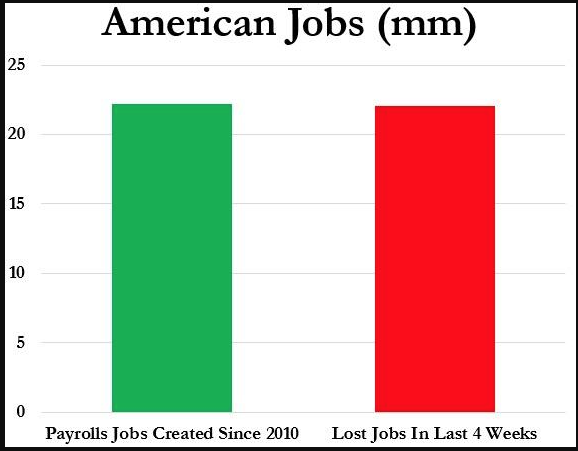Graph courtesy of The Wall Street Journal
Current college students, many who find themselves at home though would rather be finishing their school year on college campuses around the country, will be confronting along with their older colleagues who graduated college in 2019, 2018, a possibly more complicated problem that of protracted unemployment.
In addition, the long term economic outlook for those recently graduated from college, Class of 2020 graduates as well as underclassmen still matriculating behind them, is not hopeful, even once the immediate risks of the COVID-19 health crisis pass. As stated in a recent Wall Street Journal article:
The biggest wild card in the jobs outlook is how long it will take for jobs to bounce back, which depends heavily on how long the pandemic and social-distancing measures last. The consensus among the economists surveyed by the Journal is for employment to return to its February 2020 level in 27 months, but views varied widely.
Economist Amy Crews Cutts, of AC Cutts & Associates LLC, expects the labor market to take 5½ years to fully bounce back. The sheer scale of job cuts so far, even if they don’t worsen further, are “an extraordinary number of jobs to reverse and put back into the economy,” she said.
Wall Street Journal, April 14, 2020
With nearly 20 million first time jobless claims in April, as we discussed here, and some economists estimating that nearly all the jobs lost in the last month equal the total number of jobs added since the recession to 2010, recent college grads already struggling to gain an economic foothold—41% of them were underemployed already before the pandemic-induced economic upheaval, and possibly now unemployed—and Class of 2020 college students will likely not experience the promised economic prosperity from having earned a college degree, in the immediate term and possibly throughout the next decade according to economists’ estimates. Thus, tasting the bitterness of broken promise, Gen Z’ers as well as their older Millennial cohorts who are now living through a second Great Financial Crisis, may become even more disaffected and disenfranchised, therefore further souring the sentiment regarding the value of obtaining a college degree.
Since 2003, Jill has been meticulous in advising clients about all aspects of the educational experience, no matter the level of complexity. A UCSD and Harvard graduate, as well as a former high school teacher, Jill works tirelessly so clients succeed. Contact her at jill@creativemarbles.com for more details about how her expertise can benefit families or organizations.




